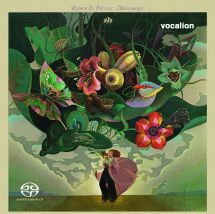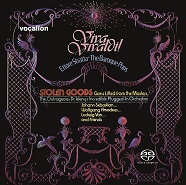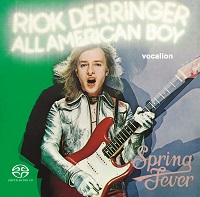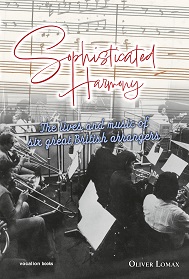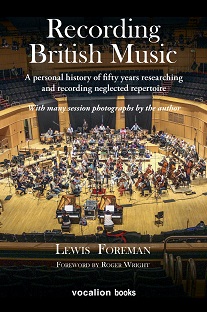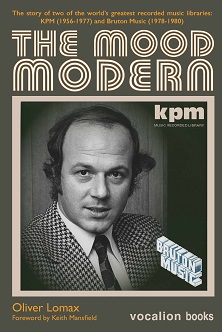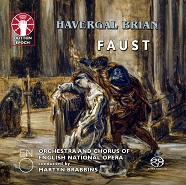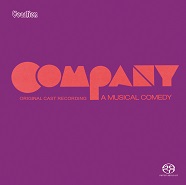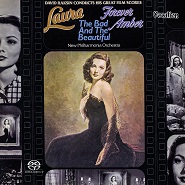Quality and variety have always been two of our guiding principles. So, with that in mind, in this veritable feast of new releases you’ll find sumptuous easy listening from Henry Mancini, Paul Mauriat, Hugo Montenegro and Jackie Gleason, the best in vocalists (Cleo Laine, Perry Como, Demis Roussos, Caterina Valente and Nana Mouskouri) and the finest in big bands, Latin and jazz (Ted Heath, Edmundo Ros and John Dankworth) nestling alongside superb film soundtracks by Elmer Bernstein and Neal Hefti, wonderfully vibrant library music by Neil Richardson, David Lindup and Stan Tracey, and exciting jazz-funk from the Morrissey Mullen and Hiroshima bands. And for some of these titles we’ve now made the move into four-channel quadraphonic sound. (For further information about our quadraphonic titles, see the quadraphonic section below.)
Starting with the vocalists, we’re proud to introduce Nana Mouskouri to the Vocalion label. The albums … Songs from Her TV Series & Turn on the Sun are culled from her 1970s Fontana discography and include some of the material she performed on such light entertainment shows as Morecambe & Wise and The Two Ronnies. Of course, they’re all lovely songs, and even more so in Nana’s interpretations. The same can be said of Demis Roussos, who demonstrates his multilingual skills in Universum (1979) and Die Nacht und der Wein (1976), both of which feature his beautiful German-language versions of songs including Sometimes When We Touch, From Souvenirs to Souvenirs and Happy to be on an Island in the Sun. French-born songstress Caterina Valente continues the multilingual theme in Tanz mit Catrin (1965, sung in German) and Personalità (1960, sung in Italian) – and here Tanz mit Catrin is making its first appearance on CD. The inimitable Cleo Laine, widely regarded as one of the world’s greatest jazz singers, makes her Vocalion debut with two wonderful albums – If We Lived on the Top of a Mountain and Portrait – originally recorded for the Fontana and Philips labels back in the late ’60s and early ’70s. On both she’s accompanied by an all-star British big band led by her late husband, John Dankworth, and she applies her incredible four-octave voice to a range of evergreens as well as contemporary songs by writers such as Mike Gibbs and Peter Sykes. Talking of John Dankworth, his big band is back with a further two volumes of transcription recordings made for the BBC in the late ’50s. After a hiatus of seven years, Latin bandleader extraordinaire Edmundo Ros makes a welcome reappearance on the Vocalion imprint with an attractive – not to mention very rare – set of BBC transcription recordings from 1955. And Britain’s foremost big band of yesteryear, the Ted Heath Orchestra, is also featured in the ninth volume of BBC transcription recordings.
The music of Gallic maestro and eternal Vocalion favourite Paul Mauriat is heard on three CDs, all of which are sourced from his considerable ’70s and ’80s output. The Seven Seas (1984) and Summer Has Flown (1983) are fine examples of the Mauriat sound as it was in the mid-80s: it’s fascinating to hear the Mauriat touch applied to songs like Michael Jackson’s Thriller and Donna Summer’s She Works Hard for the Money. The L’avventura (1972) and Le Lac Majeur (1972) albums find Mauriat in more familiar territory but are just as engaging, presenting a selection of popular songs from the early ’70s alongside a few of Mauriat’s own compositions. We’re in the late ’70s for C’est La Vie (1977) and Brasil Exclusivamente Vol. 2 (1978), the first of which features then-contemporary hits including Vangelis’s Pulstar and Donna Summer’s I Feel Love, the second of which features a range of gorgeous Brazilian tunes in Mauriat’s colourful modern arrangements. Moving across the Continent to Germany, we have another two superb easy listening CDs: one featuring the golden-toned trumpet of Horst Fischer backed by the Werner Müller Orchestra, the other the distinctive accordion playing of Will Glahé. Recorded in the late ’60s, the two Horst Fischer albums – The Golden Trumpet and Trumpet for Lovers – now complete our survey of his Decca/Teldec releases. Continuing in the easy listening vein, American actor-cum-conductor Jackie Gleason leads his orchestra through two characteristically romantic albums – 1970’s Come Saturday Morning and 1966’s How Sweet it is for Lovers – with elegant solo contributions from Don Goldie and Pee Wee Erwin (trumpets) and Charlie Ventura (tenor sax).
Flying Start represents Vocalion’s sixth volume of music from the legendary KPM 1000 Series recorded music library. Focusing on the ten-year period between 1968 and 1978, it compiles 28 of the finest 1000 Series compositions by such brilliantly gifted arranger-composers as Nick Ingman, David Lindup, Keith Mansfield, Neil Richardson, Stan Tracey and John Dankworth. The emphasis is very much on majestic orchestral and big band sounds with contemporary rhythm, and yet there’s also room for romantic interludes, avant-garde spacey jazz, abstract underscores and more besides. In fact, the whole thing comes over as a soundtrack – for example, the sort of colourful, dramatic music that would underscore a 1970s Pathé documentary about a fleet of Land Rovers trekking across the desert. More soundtrack material is available on two CDs featuring the scores to three swinging American films of the ’60s. The composers in question are giants of the movie music field: Elmer Bernstein and Neal Hefti. Bernstein’s score for 1966’s The Silencers starring Dean Martin, a playful pastiche of the James Bond/spy genre, is suitably cool, jazzy and dramatic. Neal Hefti’s scores for the oddly titled Oh Dad, Poor Dad, Mamma’s Hung You in the Closet and I’m Feelin’ So Sad (1967) is another example of jazzy, upbeat American movie music, while his score for Boeing Boeing (1966), a screwball comedy starring Tony Curtis and Jerry Lewis, contains several examples of his sophisticated, romantic orchestral writing.
Music of a very different kind is on offer in two CDs showcasing the jazz-funk sound of the late ’70s and early ’80s. Formed in in Los Angeles 1974, the Hiroshima group forged its reputation as an eclectic band incorporating elements of R&B, soul, pop and jazz but with the distinctive sound of the koto and the spirit of Japan at its core. Flautist-saxophonist-composer Dan Kuramoto, a third-generation Japanese American born and raised in East Los Angeles, and June Kuramoto, one of the world’s leading koto players, have always been Hiroshima’s driving, creative force. Under their leadership the band secured a deal with the Arista label in 1979, which resulted in two albums – Hiroshima (1979) and Odori (1980) – that have since become classics of the jazz-funk/crossover genre, and are compiled here for your listening pleasure. These albums include such jazz-funk classics as Lion Dance and Cruisin’ J-Town, while Odori features several Dan Kuramoto compositions with a panoramic quality. That quality, allied to Jorge del Barrio’s beautiful orchestrations, makes them sound like they belong in a film score – and in the 21st century this very human, thought-provoking music remains as evocative as ever.
Over here in the UK, Morrissey Mullen was one of the premier jazz-funk outfits, enjoying both critical and commercial success at a time when bands like Shakatak, Freez, Light of the World and Level 42 were also emerging from Britain’s nascent jazz-funk scene. Founding members saxophonist Dick Morrissey and guitarist Jim Mullen met in the mid-1970s thanks to their mutual friendship with various members of the Average White Band. In 1976 they were invited to New York by the AWB ostensibly to work on some music, but instead it resulted in the first Morrissey Mullen album, Up (Atlantic Records, 1977), with backing by the AWB. Returning to Britain, Morrissey Mullen recorded one album for EMI’s Harvest label (Cape Wrath, 1979) before signing to independent label Beggars Banquet and recording a series of albums throughout the 1980s that are among their best. Their second and third albums for Beggars Banquet, Life on the Wire (1982) and It’s About Time … (1983), are compiled here and both offer shining examples of the band’s lyrical yet driving brand of jazz-funk. Vocalists Carol Kenyon and Tessa Niles are featured, and albums like these demonstrate that some of the very best jazz-funk came from these shores.
Into the Fourth Dimension … Quadraphonic sound comes to Vocalion
With Vocalion’s Christmas 2015 release, a new world of audio is opened up. Remember the Quadraphonic boom of the 1970s? It was when many of the major record companies decided that stereo was no longer enough and launched four-channel (quadraphonic) sound. For that section of the record-buying public fortunate enough to own a hi-fi system capable of reproducing four-channel recordings, they were able to hear music literally in a new dimension, because now not only did the sound come at them from front-left and front-right (as it would in conventional stereo), but also from back-left and back-right too. This “surround” effect placed the listener in the centre of the music instead of just in front of it, and as a result new meaning, depth and clarity was brought to the music that emanated from the LP spinning on the turntable or the 8-track cartridge whirring in the tape player. Thankfully, many of the artists who appear so regularly on Vocalion were originally recorded in glorious quadraphonic sound, and we’re excited to present twelve quadraphonic albums across six discs in the SACD – Super Audio Compact Disc – format. (These SACDs also play on any standard CD player, in which they’ll yield full stereo sound.) The artists involved are among the giants of the easy listening field and, we’re very glad to say, have become fixtures on the Vocalion label.
Two of the SACDs are devoted to the lush orchestral music of Henry Mancini. On the first, trumpeter-flugelhornist virtuoso Doc Severinsen partners him in two albums, Brass on Ivory (1972) and Brass, Ivory and Strings (1973), while the second features the elegant piano style of Mancini himself backed by full orchestra in Six Hours Past Sunset and A Warm Shade of Ivory, both from 1969. Mancini’s music is particularly apt for the four-channel treatment. Being enveloped by his rich, sweeping strings adds considerably to the music’s emotional impact. Pianist and country music supremo Floyd Cramer returns with four albums on two separate SACDs: Class of ’73 and Class of ’74-’75, and Super Country Hits (1973) and The Young and the Restless (1974). Produced by Chet Atkins and recorded at the famous “Nashville Sound” Studios, it’s certainly an ear-opening experience hearing Cramer’s inimitable piano in wide, expansive four-channel audio. And you’ll marvel at just how alive and vibrant his country interpretations of popular hits are when given the quadraphonic treatment.
American conductor-arranger-composer Hugo Montenegro is featured on an SACD compiling two remarkable albums he recorded in the early and mid-70s. Others by Brothers (1975) saw him blending his bank of ARP synthesizers with conventional instrumentation in arrangements of soul, jazz and funk hits. The Duke Ellington staple Caravan comes up shining anew in this funky, electric version, and you’ve certainly never heard the soul classics What’s Going On and Nothing from Nothing in such inventive and colourful orchestrations as you will do on this SACD – and adding to the excitement is their rendering in quadraphonic sound. Scenes and Themes (1972) presents a selection of popular film themes in Montenegro arrangements designed specifically for the four-channel recording process.
Last but certainly not least, the final SACD in this batch focuses on the smooth-as-silk voice of legendary crooner Perry Como, in two albums from his vast discography: Perry (1974) and In Person at the International Hotel, Las Vegas (1970). On both, he applies his elegant vocal style to a smorgasbord of evergreens such as Temptation, Without a Song and Hello, Young Lovers that sit alongside songs of the ’70s including You Are the Sunshine of My Life, The Way We Were and Beyond Tomorrow. Again, four-channel sound introduces an exciting extra dimension, especially so on the In Person … album, which was recorded live: four-channel conveys the magical ambience of a concert in a way that conventional stereo simply can’t.
Now for the technical bit. Vocalion’s Hybrid SACDs consist of three layers: a standard stereo CD layer at 16-bit 44.1khz, and two separate high-resolution layers, each of which have been mastered at 24-bit 352khz – one in stereo, the other in four-channel 4.0. Michael J. Dutton remastered both the stereo and four-channel elements from the original analogue tapes: for the stereo element the original ¼” stereo masters were used, and for the four-channel element the original four-channel “discrete” masters were used. These were used respectively to cut the original stereo and quadraphonic vinyl LPs.
Read More


 Login Status
Login Status 
